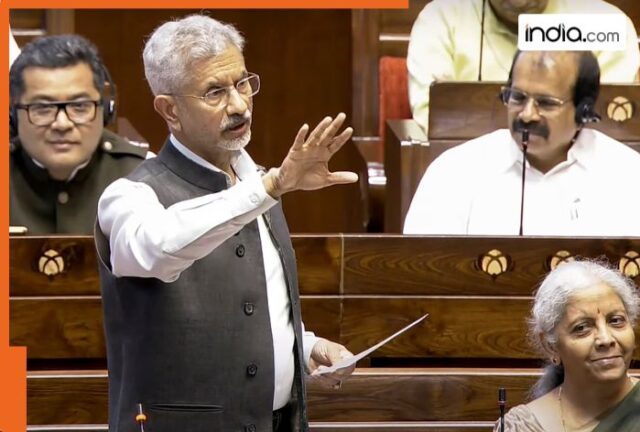The External Affairs Minister said terrorism is now on the global agenda only because of the efforts of the Modi government.
External Affairs Minister S. Jaishankar spoke strongly in the Rajya Sabha on Wednesday, criticizing the Opposition for pretending not to understand the meaning of “India’s new normal.” He introduced a new term, “Modi normal” to explain how India now deals with terrorism under Prime Minister Narendra Modi’s leadership. While taking part in the Operation Sindoor debate, Jaishankar said some members in the House had made a big issue out of the term “new normal.” So, he explained it in a simple way by comparing “Modi normal” with “Congress normal.”
He said that the “Modi normal” is all about having a clear and firm stand on national security and this stand does not change under pressure.
He listed five key points that define India’s current security policy:
- Terrorists won’t be treated as someone else’s problem – they will be punished directly.
- Terror attacks from across the border will get a strong answer.
- India will not hold peace talks while terror continues.
- India will not bow to threats of nuclear weapons.
- India won’t allow both blood (violence) and water (cooperation) to flow at the same time.
In short, Jaishankar said that under the Modi government, India has a strong and clear way of handling threats and it will not compromise when it comes to the country’s safety.
What is the idea of ‘new normal’ in India?
The idea of the ‘new normal’ in India’s security policy began after the Modi government gave full freedom to the Indian Armed Forces during Operation Sindoor. From now on, any terror attack on Indian land will be seen as a direct attack on India’s sovereignty and India will respond with full military strength.
External Affairs Minister S. Jaishankar said that Operation Sindoor helped not just India, but the whole world, by targeting and destroying terrorist camps in Pakistan.
He said places like Bahawalpur and Muridke are major hubs where terrorists are trained and sent across the world especially to India. But Indian forces destroyed those camps. “Our forces did a great job — not just for us, but for global peace. That’s why they’re being praised around the world,” he said.
He also criticized the Opposition for doubting or downplaying the work of Indian soldiers. He said there are many examples of Pakistan’s military bases being hit, but some people in India still don’t want to accept the truth just for political reasons.
Jaishankar even referred to a statement by Pakistan’s Prime Minister Shehbaz Sharif, who admitted that India’s military strikes had hit important Pakistani locations. He said Pakistan’s Army Chief, General Munir, called PM Sharif and told him that Indian missiles like BrahMos had struck their Noor Khan air base and even areas like Rawalpindi.
Jaishankar’s clarification on Trump-Modi’s phone call
Jaishankar also clarified that PM Modi and the US President did not have any phone calls between April 22, when the Pahalgam terror attack took place, and June 16. He said India will not tolerate any cross-border terrorism and has responded to Pakistan by carrying out Operation Sindoor and will continue to do so.
“…Main unko kehna chahta hoon, woh kaan kholke sun le. 22 April se 16 June tak, ek bhi phone call President Trump aur Prime Minister Modi ke beech mein nahi hua. (I want to tell them to listen carefully: from April 22 to June 16, not a single phone call took place between President Trump and Prime Minister Modi) ” Jaishankar said in the Upper House of Parliament.
He further emphasised India’s firm stance against mediation in India-Pakistan matters, asserting that any dialogue must be bilateral and that Pakistan must formally request a cessation of conflict through the DGMO.
The External Affairs Minister said terrorism is now on the global agenda only because of the efforts of the Modi government.
He said India exerted huge pressure on Pakistan through the Financial Action Task Force (FATF) process and also despite not being a member of the UN Security Council, India was able to get UN recognition that The Resistance Front (TRF) is a proxy of Pakistan-based LeT.
(With inputs from agencies)
















































